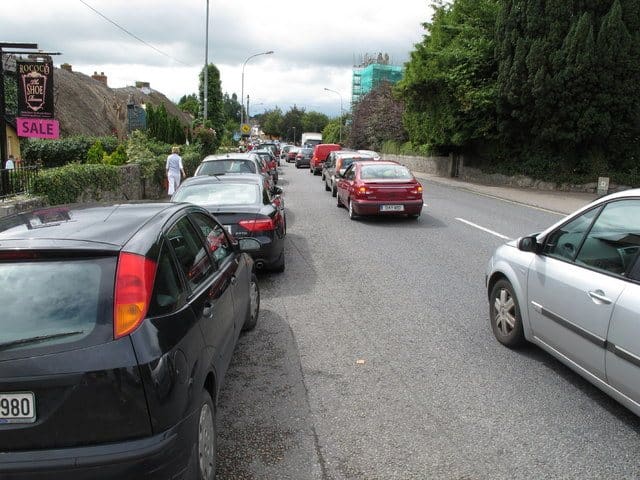With the world cup up and running and many looking forward to watching the matches in their locals the AA is appealing to soccer fans, particularly young males, not to take a lift from a drunk driver.
Highlighting the frequency of the practice, in a past AA Motor Insurance poll of close to 15,000 people, 13% of overall respondents said they had travelled in a car with someone they knew to have more than the legal permissible amount of alcohol in their system during the 12 months prior to the survey.
This figure was much higher however among young males with 30% of those aged 17-24 stating they had knowingly done so during the period. This compared to 19% of females within the same age bracket who took the risk of accepting a lift from a drunk driver according to the AA’s research.
“Many college students are now on their Summer hiatus and with the world cup up and running there’s already a bit of festival atmosphere especially with some of the nice evening we’ve been having.” Says Conor Faughnan, Director of Consumer Affairs, AA Ireland. “It’s lovely to be able to sit out in a beer garden and feel relaxed especially if you haven’t got work or college the next day but please give a bit of thought to how you’ll get home at the end of the night whether it’s a taxi, public transport or a designated driver.”
On a county level, the highest percentage of respondents in Wicklow (22%), Louth (19%), Kilkenny (17%), Longford (17%) and Meath (17%) in that order admitted that they had gotten in a car with a driver they knew had drunk more than they should have.
The AA is also appealing to all drivers to be extra careful driving through residential areas over the next few weeks as children gripped by world cup fever are more likely to be out having a kick about.
Another message the motor insurance providers hope to impress upon young male adults taking to the pub to enjoy the soccer is not to underestimate your blood alcohol levels the morning after a session. 59% of the men aged between 17-24 polled by the AA shared that they had run the risk of driving “the morning after the night before” at least once during the 12 months prior to the poll while unsure if they were still over the legally permissible limit. 66% of males within this age category also said they’d gotten into a car with at least once over the one year period with someone they would describe as severely hungover.
“The range of symptoms that arise from a hangover such as headaches, light headedness, nausea, thirst, lethargy and a decreased attention span can significantly impair your ability to drive and can make you potentially as dangerous as an intoxicated driver.” Says Conor Faughnan, Director of Consumer Affairs, AA Ireland
End
Notes to the editor;
(Data collected via AA online poll in September 2012)
Fig. 1 How often within the last year, if ever, respondents said they have knowingly travelled as a passenger in a vehicle where they knew/suspected the driver to be any of the following? (Based on 14,884 responses)
| Daily | Regularly | Seldom | Rarely | Never | |
| Over the legal blood alcohol limit. | 0.0% | 0.6% | 2.4% | 10.0% | 87.0% |
| Under the influence of illegal drugs. | 0.0% | 0.2% | 0.6% | 1.4% | 97.8% |
| Severely hung over. | 0.1% | 1.3% | 6.3% | 17.3% | 75.0% |
| Unfit to drive due to some other physical impairment. | 0.0% | 0.2% | 0.6% | 2.4% | 96.8% |
Fig. 2 How often within the last two years, 17 to 24 year old respondents indicated they have, if ever, travelled as a passenger in a vehicle where they knew/suspected the driver to be any of the following (Based on 443 responses):
| Daily | Regularly | Seldom | Rarely | Never | |
| Over the legal blood alcohol limit. | 0.0% | 2.3% | 2.8% | 15.0% | 79.9% |
| Under the influence of illegal drugs. | 0.5% | 1.4% | 2.8% | 5.6% | 89.8% |
| Severely hungover. | 0.9% | 9.3% | 17.7% | 27.9% | 44.2% |
| Unfit to drive due to some other physical impairment. | 0.0% | 1.4% | 2.8% | 2.3% | 93.5% |
Fig. 3 How often within the last two years, 17 to 24 YEAR OLD MALE respondents indicated they have, if ever, travelled as a passenger in a vehicle where they knew/suspected the driver to be any of the following (Based on 180 responses):
| Daily | Regularly | Seldom | Rarely | Never | |
| Over the legal blood alcohol limit. | 0% | 2.2% | 7.7% | 19.8% | 70.3% |
| Under the influence of illegal drugs. | 0% | 0% | 7.8% | 5.6% | 86.7% |
| Severely hung-over. | 0% | 10% | 16.7% | 38.9% | 34.9% |
| Unfit to drive due to some other physical impairment. | 0% | 0% | 1.1% | 11.1% | 87.8% |
Fig. 4 How often within the last two years, 17 to 24 YEAR OLD FEMALE respondents indicated they have, if ever, travelled as a passenger in a vehicle where they knew/suspected the driver to be any of the following (Based on 258 responses):
| Daily | Regularly | Seldom | Rarely | Never | |
| Over the legal blood alcohol limit. | 0% | 1.5% | 4.5% | 12.9% | 81.1% |
| Under the influence of illegal drugs. | 0.8% | 0.0% | 0.8% | 7.5% | 91% |
| Severely hung-over. | 0.7% | 6% | 9.7% | 41.8% | 41.8% |
| Unfit to drive due to some other physical impairment. | 0% | 0% | 3.8% | 6.8% | 89.5% |
Fig. 5 % of respondents from each respective county who indicated that they have at some point during year travelled as a passenger in a vehicle where they suspected the driver to be any of the following (Based on 14,884 responses):
| County plus # of respondents | Over the legal blood alcohol limit. | Under the influence of illegal drugs. | Severely hung-over. |
| Carlow (150 resps.) | 9% | 3% | 28% |
| Cavan (134 resps.) | 9% | 3% | 21% |
| Clare (316 resps.) | 15% | 2% | 24% |
| Cork (1618 resps.) | 13% | 2% | 24% |
| Donegal (298 resps.) | 12% | 2% | 23% |
| Dublin (5354 resps.) | 12% | 3% | 25% |
| Galway (676 resps.) | 16% | 0.6% | 23% |
| Kerry (224 resps.) | 14% | 2% | 11% |
| Kildare (876 resps.) | 12% | 2% | 25% |
| Kilkenny (172 resps.) | 17% | 1% | 28% |
| Laois (190 resps.) | 13% | 2% | 25% |
| Leitrim (78 resps.) | 13% | 3% | 24% |
| Limerick (548 resps.) | 14% | 2% | 22% |
| Longford (72 resps.) | 17% | 3% | 36% |
| Louth (324 resps.) | 19% | 4% | 24% |
| Mayo (272 resps.) | 16% | 2% | 27% |
| Meath (592 resps.) | 17% | 1% | 29% |
| Monaghan (100 resps.) | 4% | 2% | 24% |
| Offaly (166 resps.) | 12% | 4% | 22% |
| Roscommon (174 resps.) | 16% | 1% | 82% |
| Sligo (166 resps.) | 11% | 1% | 6% |
| Tipperary (364 resps.) | 6% | 1% | 24% |
| Waterford (338 resps.) | 13% | 3% | 25% |
| Westmeath (248 resps.) | 14% | 3% | 28% |
| Wexford (188 resps.) | 15% | 0% | 24% |
| Wicklow (680 resps.) | 22% | 2% | 24% |
Fig. 6 How often, if ever, within the last year respondents said they have run the risk of driving “the morning after the night before” whilst unsure whether their blood alcohol level had returned to within the legally permissible limit within the last year. (Based on 14,884 responses):
| 2012 | |
| Daily | 0.1% |
| Regularly | 2.1% |
| Seldom | 8.7% |
| Rarely | 29.0% |
| Never | 60.1% |
Fig. 7 How often if ever, 17 – 24 YEAR OLD RESPONDENTS POLLED have run the risk within the last year of driving “the morning after the night before” whilst unsure whether their blood alcohol level had returned to within the legally permissible limit. (Based on 443 responses):
| 2012 | |
| Daily | 0.0% |
| Regularly | 6.2% |
| Seldom | 16.7% |
| Rarely | 36.1% |
| Never | 41% |
Fig. 8 How often if ever, MALE RESPONDENTS POLLED have run the risk of driving “the morning after the night before” within the last year whilst unsure whether their blood alcohol level had returned to within the legally permissible limit (Based on 7,461 responses):
| 2012 | |
| Daily | 0.1% |
| Regularly | 2.8% |
| Seldom | 9.7% |
| Rarely | 31.7% |
| Never | 55.7% |
Fig. 9 How often if ever, MALE RESPONDENTS POLLED AGED 17-24 have run the risk of driving “the morning after the night before” within the last year whilst unsure whether their blood alcohol level had returned to within the legally permissible limit (Based on 180 responses):
| 2012 | |
| Daily | 0% |
| Regularly | 7.7% |
| Seldom | 22% |
| Rarely | 40.7% |
| Never | 29.7% |
Fig. 10 How often if ever, FEMALE RESPONDENTS POLLED have run the risk of driving “the morning after the night before” within the last year whilst unsure whether their blood alcohol level had returned to within the legally permissible limit (Based on 6,314 responses):
| 2012 | |
| Daily | 0.0% |
| Regularly | 1.2% |
| Seldom | 7.4% |
| Rarely | 25.6% |
| Never | 65.7% |
Fig. 11 How often if ever, FEMALE RESPONDENTS POLLED AGED 17-24 have run the risk of driving “the morning after the night before” within the last year whilst unsure whether their blood alcohol level had returned to within Thelegally permissible limit. (Based on 258 responses):
| 2012 | |
| Daily | 0% |
| Regularly | 4.5% |
| Seldom | 12.8% |
| Rarely | 33.8% |
| Never | 48.9% |










